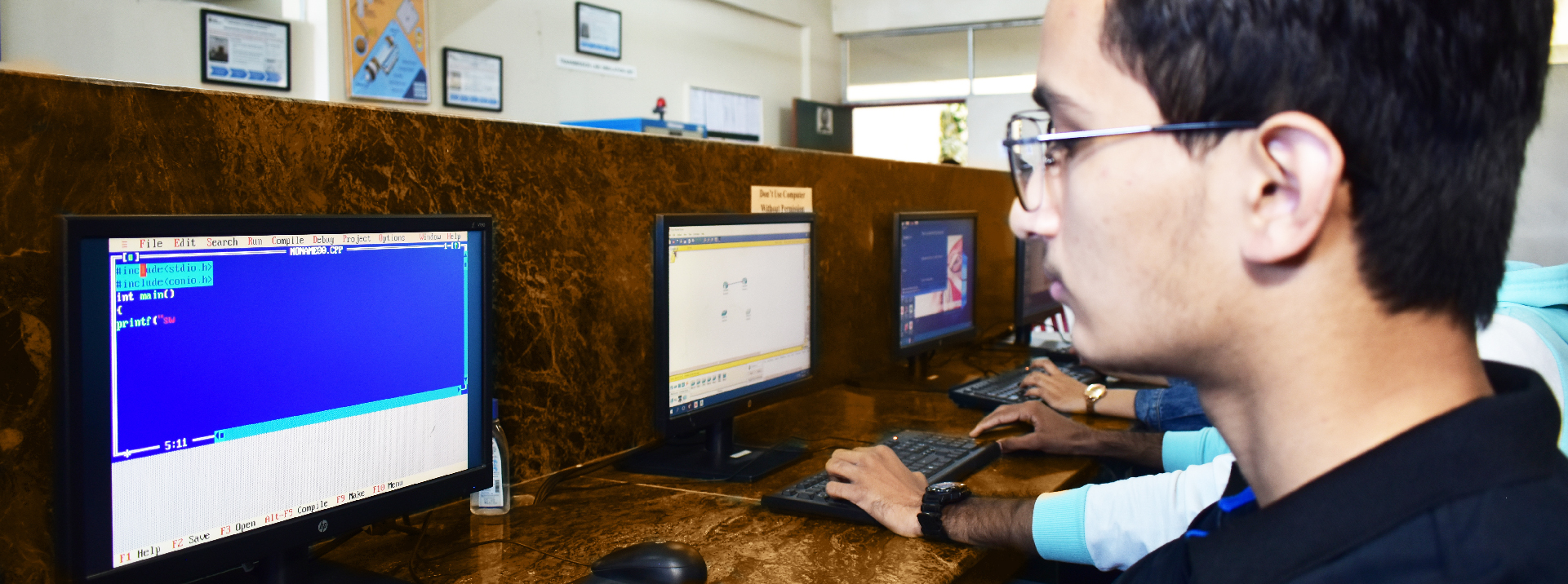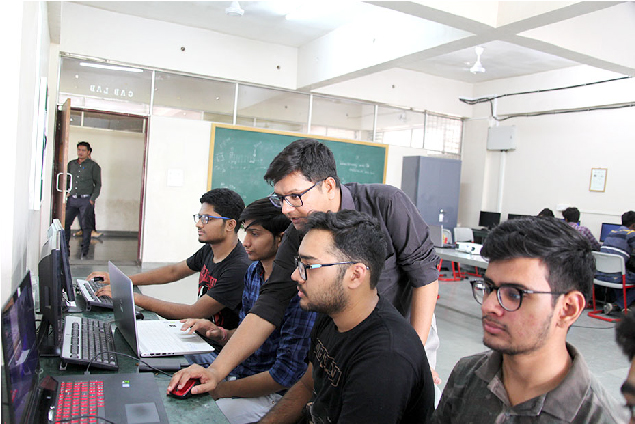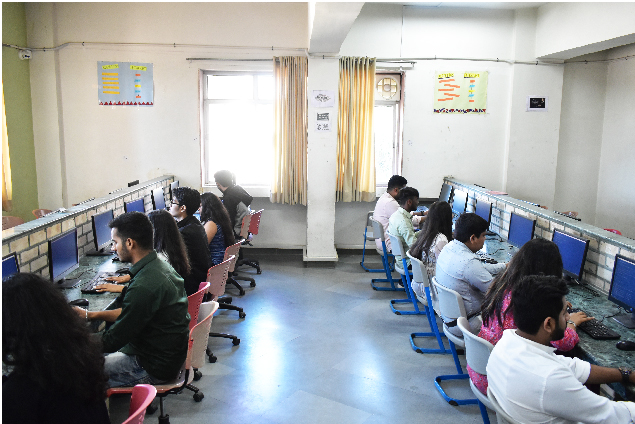Announcement
Get Ready for INDUS CUP 2K26! | Dates: 5–10 January 2026 | Stand a Chance to Win Cash Prizes up to ₹10,00,000!...Read more Get Ready for INDUS CUP 2K26! | Dates: 5–10 January 2026 | Stand a Chance to Win Cash Prizes up to ₹10,00,000!
We are excited to announce the Indus Hackathon 2025, an exhilarating one-day event organized by the CSE Department of Indus University....Read more We are excited to announce the Indus Hackathon 2025, an exhilarating one-day event organized by the CSE Department of Indus University.
26th ISTE Faculty Annual State Convention will be held at Indus University on April 27, 2023....Read more 26th ISTE Faculty Annual State Convention will be held at Indus University on April 27, 2023.
Get Ready for INDUS CUP 2K26! | Dates: 5–10 January 2026 | Stand a Chance to Win Cash Prizes up to ₹10,00,000!...Read more Get Ready for INDUS CUP 2K26! | Dates: 5–10 January 2026 | Stand a Chance to Win Cash Prizes up to ₹10,00,000!
We are excited to announce the Indus Hackathon 2025, an exhilarating one-day event organized by the CSE Department of Indus University....Read more We are excited to announce the Indus Hackathon 2025, an exhilarating one-day event organized by the CSE Department of Indus University.
26th ISTE Faculty Annual State Convention will be held at Indus University on April 27, 2023....Read more 26th ISTE Faculty Annual State Convention will be held at Indus University on April 27, 2023.

Students pursuing a B.Tech in Computer Science and Engineering acquire the knowledge, abilities, and skills required to design devices, develop computer architecture, and develop new applications and technologies. With the final semester devoted to industrial projects, the Computer Science and Engineering degree offers a wide range of core computer-related subjects and electives.
Computer Science and Engineering graduates combine their expertise in hardware and software to develop new computer components or enhance existing ones. Computer Science and Engineering graduates are prepared for well-respected and lucrative hardware and software design, development, research, and testing jobs.
This program gives graduates a competitive advantage through a strong curriculum and hands-on learning in a narrow technology to develop skills that meet industry demands. It mainly deals with process development and computer software and hardware, with a strong focus on algorithms, programming languages, program design, etc.
The Computer Science and Engineering department offers a bachelor's degree in computer science and engineering (B.Tech). As the premier engineering college in Ahmedabad, Gujarat, the department has highly qualified, experienced staff members with advanced degrees. Indus University is one of Gujarat's leading Computer Science and Engineering institutions.
Pursuing engineering at a respected university in Gujarat is essential since it guarantees long-term success and professional dignity. Our students benefit from programs that assist them develop into professionals and advanced individuals in their disciplines. Additionally, the program includes practical and specialized knowledge that prepares our students to work as professionals in the industry.
The department places equal emphasis on the students' general growth and their academic performance. In addition to engaging in debates and group discussions, it arranges co-curricular events like educational workshops, industrial visits, expert talks on cutting-edge technologies, and various technical events like coding competitions, hackathons, etc.
The B.Tech Program in Computer Science and Engineering offered by the IITE, Department of Computer Engineering focuses on providing students with a comprehensive education beyond traditional academics. Our department is dedicated to nurturing well-rounded individuals, emphasizing academic excellence and holistic development. Alongside rigorous coursework, students actively engage in many extracurricular activities to enhance their skills and broaden their horizons. From insightful seminars and enlightening industrial visits to captivating expert speeches on the latest technologies, our students are exposed to a wealth of knowledge and real-world experiences. Additionally, we foster a culture of innovation through exciting technical events such as coding competitions and hackathons, encouraging creativity and problem-solving abilities. Regular debates and group discussions further stimulate critical thinking and communication skills.
The Computer Science Engineering department is committed to developing individuals who excel academically and grow holistically. In addition to coursework, students actively participate in extracurricular activities to improve their skills and expand their perspectives. These activities include seminars, educational industry visits, and engaging talks by experts on cutting-edge technologies providing students with knowledge and practical experiences. Moreover, we promote an atmosphere of innovation through events, like coding competitions and hackathons which foster creativity and problem-solving skills. Regular debates and group discussions also help stimulate thinking and enhance communication abilities.
The Admission Committee for Professional Courses (ACPC) will admit students on the basis of merit on 50% of the sanctioned strength for each course. The student needs to register himself with ACPC after the result.
50% seats of the sanctioned strength of each course are Management Quota, admission of which is handled by the institute as per guidelines of ACPC.
Minimum Aggregate 45% in Physics, Chemistry & Mathematics, Theory exam in H.S.C. of any boards.
Course Duration
4 Years (8 Semesters)
Intake
Computer Science and Engineering – 120 Students
Engineering proficiency: To tackle complicated engineering problems, utilization of knowledge of mathematics, science, engineering fundamentals, and an engineering specialty.
Analysis: Using the fundamental concepts of mathematics, the natural sciences, and engineering, formulate, identify, assess research writings, and analyze complex engineering challenges to obtain validated conclusions.
Design & development solutions: Consider safety hazards, cultural and environmental considerations, and design solutions for challenging technical problems and system components or methodologies that adequately address the indicated needs.
Sustainability and Environment: Demonstrate an awareness of the impact of professional engineering solutions in societal and environmental contexts and the importance of long-lasting developments.
Individual and teamwork: Effectively perform independently, in varied groups, and in leadership roles in multidisciplinary situations.
Communication: Communicate widely about challenging engineering tasks with the engineering community and the general public, for example, by comprehending and writing robust reports and design documentation to provide persuasive presentations and get precise instructions.
Project management: Apply engineering and management ideas to one's assignment as a team member and leader to work on projects and in multidisciplinary backgrounds, demonstrating detail and comprehension in both areas.
The department has 600+ computers in its sophisticated, high-tech facilities equipped with the most recent technologies. We have M.O.U.s with several businesses, which may serve to further the academic and research goal. The Computer Science and Engineering department aim to create the best computer engineers who can positively impact society through their knowledge and abilities.
The lab is intended to motivate students to pursue their interest in learning about cutting-edge technologies. Technologies like.NET, XML, J2EE, J2ME, PYTHON, and others are taught to students to expand their education. Students can use their programming concepts to create desktop and web applications.
This lab covers software engineering and project management with all the practicals. It demonstrates the value of fundamental modelling in the software business. Learning new models for the software development life cycle will make it easier to understand and implement the requirement modelling process. It provides the ability to design both our database structure and front-end procedure.
The Data Processing Lab provides guidance with all aspects of quantitative and qualitative data collection, analysis, and interpretation. This laboratory deals with Data Science, Data Mining, Data Preparation and Analysis, Database Management System and Distributed Database Management System subjects with all the practicals. Students can do practicals in this laboratory using various software such as R Programming, SQL, ORACLE, Weka, MYSQL, etc.
This laboratory deals with Wireless and Mobile communication subjects that contain all android practicals and android application projects. It consists of low-level programming assignments on Android smartphones.
This laboratory deals with LAX, YACC tools, Operating System and Distributed Operating System subjects with all practicals. It deals with symbol table (Tree Storage) construction, Implementation of single pass, two pass Assembler, Macro Preprocessor, module binder (with Limited instruction set). It will help the students to implement software tools like Text editor, Interpreter, program generator etc.
This laboratory deals with Computer networks, I.C.T., D.C.N. subjects with all practicals. Networking Lab is a dedicated facility for the teaching of Computer networking. This allows students to arrange routers, switches, LAN, etc. It is also equipped with its wireless networks and has network simulation software for student benefit.
To meet the general computing requirements of both students and faculties, the Central Computing facility is maintained. The institution knows how critical information technology is to teaching and research. It is dedicated to offering the best computer facilities as a result.
The Basic Programming Laboratory's goal is to offer a setting for learning and better comprehension of the fundamental ideas and procedures of computer programming. It advises students to concentrate more on mastering programming skill than programming languages. The students investigate the capabilities of C/C++.
As a computer science engineer, the student can have the option of getting countless job opportunities and career opportunities that will make their future secure and shine. Here are all of the career paths open to computer science engineers.
Numerous employment prospects, including those for developers, database managers, data analysts, testers, programmers, tech support specialists, software engineers, web developers, etc., are unlocked by the B.Tech Computer Science and Engineering degree. The placement areas for B.Tech studies in Computer Science and Engineering are available in various industries that deal with software. Students studying in their last year of B.Tech receive on-campus placements.
The Training & Placement Department (T & P Dept.) at Indus University has a separate team that bridges two important ends: academia and industry. It demonstrates a link between educational institutions, university departments, and businesses.
The focal point for career counselling for university students pursuing studies in all programmes and streams is the Training & Placement Department (T & P Dept.). It provides students with comprehensive career options by assisting them in choosing and pursuing their ideal vocations.
The Admission Committee for Professional Courses (ACPC) will admit students on the basis of merit on 50% of the sanctioned strength for each course. The student needs to register himself with ACPC after the result.
50% seats of the sanctioned strength of each course are Management Quota, admission of which is handled by the institute as per guidelines of ACPC.
Minimum Aggregate 45% in Physics, Chemistry & Mathematics, Theory exam in H.S.C. of any boards.
Course Duration
4 Years (8 Semesters)
Intake
Computer Science and Engineering – 120 Students
Engineering proficiency: To tackle complicated engineering problems, utilization of knowledge of mathematics, science, engineering fundamentals, and an engineering specialty.
Analysis: Using the fundamental concepts of mathematics, the natural sciences, and engineering, formulate, identify, assess research writings, and analyze complex engineering challenges to obtain validated conclusions.
Design & development solutions: Consider safety hazards, cultural and environmental considerations, and design solutions for challenging technical problems and system components or methodologies that adequately address the indicated needs.
Sustainability and Environment: Demonstrate an awareness of the impact of professional engineering solutions in societal and environmental contexts and the importance of long-lasting developments.
Individual and teamwork: Effectively perform independently, in varied groups, and in leadership roles in multidisciplinary situations.
Communication: Communicate widely about challenging engineering tasks with the engineering community and the general public, for example, by comprehending and writing robust reports and design documentation to provide persuasive presentations and get precise instructions.
Project management: Apply engineering and management ideas to one's assignment as a team member and leader to work on projects and in multidisciplinary backgrounds, demonstrating detail and comprehension in both areas.
The department has 600+ computers in its sophisticated, high-tech facilities equipped with the most recent technologies. We have M.O.U.s with several businesses, which may serve to further the academic and research goal. The Computer Science and Engineering department aim to create the best computer engineers who can positively impact society through their knowledge and abilities.
The lab is intended to motivate students to pursue their interest in learning about cutting-edge technologies. Technologies like.NET, XML, J2EE, J2ME, PYTHON, and others are taught to students to expand their education. Students can use their programming concepts to create desktop and web applications.
This lab covers software engineering and project management with all the practicals. It demonstrates the value of fundamental modelling in the software business. Learning new models for the software development life cycle will make it easier to understand and implement the requirement modelling process. It provides the ability to design both our database structure and front-end procedure.
The Data Processing Lab provides guidance with all aspects of quantitative and qualitative data collection, analysis, and interpretation. This laboratory deals with Data Science, Data Mining, Data Preparation and Analysis, Database Management System and Distributed Database Management System subjects with all the practicals. Students can do practicals in this laboratory using various software such as R Programming, SQL, ORACLE, Weka, MYSQL, etc.
This laboratory deals with Wireless and Mobile communication subjects that contain all android practicals and android application projects. It consists of low-level programming assignments on Android smartphones.
This laboratory deals with LAX, YACC tools, Operating System and Distributed Operating System subjects with all practicals. It deals with symbol table (Tree Storage) construction, Implementation of single pass, two pass Assembler, Macro Preprocessor, module binder (with Limited instruction set). It will help the students to implement software tools like Text editor, Interpreter, program generator etc.
This laboratory deals with Computer networks, I.C.T., D.C.N. subjects with all practicals. Networking Lab is a dedicated facility for the teaching of Computer networking. This allows students to arrange routers, switches, LAN, etc. It is also equipped with its wireless networks and has network simulation software for student benefit.
To meet the general computing requirements of both students and faculties, the Central Computing facility is maintained. The institution knows how critical information technology is to teaching and research. It is dedicated to offering the best computer facilities as a result.
The Basic Programming Laboratory's goal is to offer a setting for learning and better comprehension of the fundamental ideas and procedures of computer programming. It advises students to concentrate more on mastering programming skill than programming languages. The students investigate the capabilities of C/C++.
As a computer science engineer, the student can have the option of getting countless job opportunities and career opportunities that will make their future secure and shine. Here are all of the career paths open to computer science engineers.
Numerous employment prospects, including those for developers, database managers, data analysts, testers, programmers, tech support specialists, software engineers, web developers, etc., are unlocked by the B.Tech Computer Science and Engineering degree. The placement areas for B.Tech studies in Computer Science and Engineering are available in various industries that deal with software. Students studying in their last year of B.Tech receive on-campus placements.
The Training & Placement Department (T & P Dept.) at Indus University has a separate team that bridges two important ends: academia and industry. It demonstrates a link between educational institutions, university departments, and businesses.
The focal point for career counselling for university students pursuing studies in all programmes and streams is the Training & Placement Department (T & P Dept.). It provides students with comprehensive career options by assisting them in choosing and pursuing their ideal vocations.

An imaginative educational plan of this program will empower understudies..

An imaginative educational plan of this program will empower understudies..